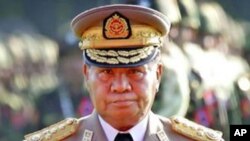Democracy advocates in Australia are calling on the government to publicly condemn Burma's November national elections. Activists say authorities in Canberra must do more to put pressure on Burma's military leadership to adopt democratic change. Phil Mercer reports from Sydney.
Three years ago, Burma's military leaders unleashed a brutal crackdown on protesters who were demanding peaceful democratic reform. Street demonstrations led by monks attracted tens of thousands of people before they were suppressed by the Burmese army.
Democracy advocates in Australia say the Canberra government must be more forceful in its condemnation of the continued harassment and imprisonment of human rights activists in Burma ahead of next month's national elections.
Activists insist that ministers must state that Burma's elections will not be considered legitimate unless all political prisoners, including democracy leader Aung San Suu Kyi, are released, the constitution is reviewed and campaign restrictions are lifted.
Australia has repeatedly urged the Burmese authorities to begin genuine political reform and national reconciliation. Since October 2007, Canberra has implemented targeted sanctions against members of the Burmese government following its violent response to peaceful protests.
Burma Campaign Australia spokesperson, Zetty Brake, says Australia should be doing more to encourage true democratic reform in Burma.
"It has been three years and unfortunately the human rights situation has not gotten better since the Saffron Revolution," Brake said. "The number of political prisoners has doubled as one example of how this situation has gotten worse and the elections in November, the first in 20 years, will not change this. So, what we are calling on the Australian government to do is to take a stronger stance than it has on the election so far and to say that these elections will not be credible or legitimate unless a number of benchmarks set by the democracy movement are met in advance and these benchmarks include the release of all political prisoners."
Australia's Department of Foreign Affairs and Trade says despite its "grave and long-standing reservations" it would not "pre-judge the election process or outcome".
Australia has diplomatic relations with Burma, although bilateral relations have been strained by Canberra's concerns over the military's "suppression of democracy" and its "disrespect" for human rights.
New Zealand is among several countries lending its support for a U.N. Commission of Inquiry to be set up to investigate alleged crimes against humanity in Burma. France, Canada and the Netherlands have also pledged their backing as international opposition to the military leadership in Burma accelerates ahead of November's elections.




